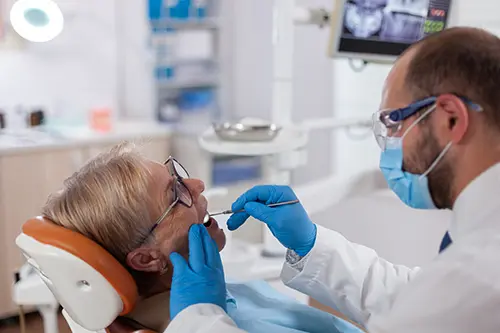Reviewed by Dr. Kerri Font, DDS

Reading time: four minutes.
Dentures help restore your smile and chewing function after tooth loss. But what many patients don’t realize is that traditional dentures do not prevent bone loss.
If you wear full or partial dentures, or you are considering your tooth replacement options, understanding the connection between dentures and bone loss is important to preserving your oral health.
In this blog, you will learn:
- Why bone loss happens after tooth loss
- How removable dentures affect the jawbone
- Long-term consequences of bone resorption
- What you can do to protect your jawbone and maintain bone health
Table of Contents
- Why Bone Loss Happens After Tooth Loss
- How Traditional Dentures Accelerate Bone Loss
- Options That Help Preserve Bone
- What If You Already Have Bone Loss?
- Visit Our Periodontics and Dental Implant Office in Highlands Ranch
Key Takeaway
Traditional dentures do not stop bone loss and can even accelerate it. Only implant-based solutions can preserve your jawbone and support long-term oral health.
Why Bone Loss Happens After Tooth Loss
When a natural tooth is lost or removed, the jawbone that once supported it begins to shrink. This process is called bone resorption.
The root of each tooth provides constant stimulation to the surrounding bone through everyday biting and chewing. Once the root is gone, the body stops maintaining that bone, assuming it is no longer needed.
Without timely replacement using an option that mimics natural roots, such as dental implants, the bone can shrink by as much as 25% in the first year alone. This jawbone loss leads to a noticeable decline in facial structures and overall bone density.
How Traditional Dentures Accelerate Bone Loss
Removable dentures (both complete dentures and partial dentures) sit on top of the gums. They do not integrate with the jawbone like natural tooth roots or implants do. While they can restore appearance and basic chewing ability, they do not provide the necessary mechanical stimulation to keep bone tissue healthy.
In fact, traditional dentures can even speed up bone loss by putting pressure on the underlying bone and gum tissue during chewing.
Over time, this pressure can accelerate the breakdown of bone material and soft tissue, causing the following issues:
- Loose or ill-fitting dentures
- Changes in facial appearance and sagging skin caused by loss of bone (often referred to as ‘denture face’)
- Sore spots and discomfort in the gum tissue
- Difficulty eating and speaking, reducing overall quality of life
Long-Term Consequences of Bone Loss in the Jaw
When bone loss continues unchecked, the jawbone becomes narrower and shorter. This not only affects how dentures fit, but also how your entire face looks. Over time, denture wearers may experience effects of bone loss that alter their facial structures and bone structure.
Common consequences of untreated bone loss include:
- Facial collapse: The lower third of the face can sink inward, giving a prematurely aged appearance.
- Bite instability: Dentures lose their suction and stability, even with adhesives.
- Painful chewing: Pressure from chewing may cause irritation or ulceration of the gum tissue.
- Lowered implant eligibility: Patients who delay treatment may eventually require bone grafting to restore enough bone for implant support.
Options That Help Preserve Bone
If you want to stop bone loss after losing teeth, you need a solution that replaces both the visible tooth and the root structure.
1. Dental Implants
These titanium posts are surgically placed into the jaw and fuse with the bone. They provide the same type of stimulation as natural teeth and are the gold standard for stopping bone resorption and supporting bone growth.
2. Implant-Supported Dentures
Also known as overdentures or hybrid dentures, these attach to 2–6 implants per arch. They offer better stability, improved chewing power, and preserve bone better than traditional dentures.
We offer options like All-on-4® dental implants, which use just four or more implants to support a full arch of teeth. This technique is ideal for patients who want a fixed solution with fewer implants, a reliable solution for people with moderate to severe bone loss.
What If You Already Have Bone Loss?
If you have worn dentures for years and already suffer from bone loss, you still have options.
Our periodontists in Colorado, Dr. Bahman (Mike) Norouzinia and Dr. Kerri Font can evaluate your bone structure using 3D imaging and determine if a bone grafting procedure is necessary to support implants.
Preventing Further Bone Loss Starts With the Right Plan
If you are considering dentures or already wear them, now is the time to explore solutions that support both function and facial structure. Dental implants are the only proven way to protect your jaw bones from shrinking after tooth loss.
We take a conservative, long-term approach, we prioritize bone preservation, patient comfort, and stability that lasts. That means helping you choose the best treatment to protect your oral health today and in the future.
Visit Our Periodontics and Dental Implant Office in Highlands Ranch
Schedule an appointment at our periodontal clinic in Highlands Ranch, CO, call (303) 683-1144 or visit us at 9090 S Ridgeline Blvd. #225, Highlands Ranch, CO 80129.
